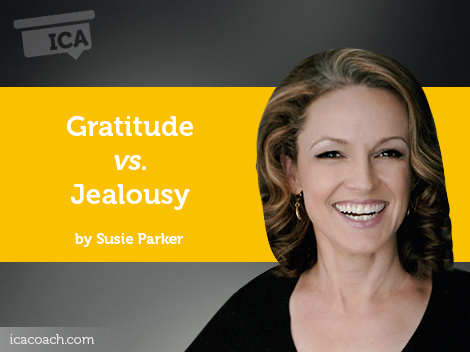
A Coaching Power Tool Created by Susie Parker
(Life Coach, AUSTRALIA)
According to Merriam Webster, gratitude is a feeling of appreciation or thanks. When you feel gratitude, you feel light. It’s a good feeling. It allows you to feel present. You can feel gratitude for something as small as receiving a compliment or gift; you can feel gratitude for having parents who gave you a proper education; you can feel gratitude simply for being alive. Feeling gratitude opens your heart to all that is good. It is a positive lens through which to view the world.
Jealousy has more negative connotations. According to Merriam Webster, jealousy is an unhappy or angry feeling of wanting to have what someone else has. We have all felt jealous at some point in our lives and for the most part, this is natural and normal. Babies will react with what could be described as innate jealousy when they see their mother holding another child; a parent might envy another parent’s more expensive stroller; I might envy another coach’s ability to write an outstanding power tool, while I struggle to write one coherent sentence. These feelings on their own don’t add up to much and, in fact, a healthy amount of jealousy can provoke us into action. But what if these feelings are left unattended? What if they start to brew and grow? Brick by brick, layers of anger and resentment caused by jealousy start to build a wall behind which a person can become trapped in a world of negativity.
Below are two stories that illustrate these emotions:
-
Sally and Jen
Sally and Jen had known each other since school and travelled the world together. While all their friends were getting married and having children, these women were hell bent on living the single lifestyle. Eventually, in her 40s, Sally met a nice guy, had a kid and then, two years ago, got married. Things didn’t pan out for Jen in the way she’d hoped. Eternally single, dating men who wouldn’t commit, she understandably started to question where she’d gone wrong and became bitter. When Sally got married, Jen didn’t handle it very well. Consumed with jealousy, she made unkind remarks about Sally behind her back, failed to show up for wedding dress fittings and was hyper-critical of the whole affair. Jen never opened up to Sally about her feelings. Their friendship suffered and while they are both still friends, Sally has put Jen on the back burner – they don’t see each other so often.
-
Emily and Sarah
Emily and Sarah were also close friends. They had known each other since school, both enjoyed rewarding careers, travelled all over the world and still managed to keep in touch. Later on in life, both women struggled to become pregnant. Emily eventually succeeded but Sarah didn’t. When Emily announced her pregnancy to Sarah, Sarah initially sounded thrilled and said all the right things. 20 minutes later she called back in tears, explaining that she was insanely jealous. She’d felt they had been in the same boat, that Emily had been her ally in their childlessness. They talked for a long time, both crying, and by the end of the conversation, the air was clear. Sarah expressed her feelings in such an honest and genuine way that as a result, the pregnancy was no longer an issue. Both women are still close friends. Sarah has come to terms with not having children and is living a rich, rewarding, childfree life with her fantastic husband.
Jen comes from a place of scarcity. It’s much harder for her to be honest and, quite possibly, she is unaware how much these emotions are holding her prisoner. Sarah comes from a place of abundance. She is able to acknowledge all the good in life and is therefore able to feel the emotions and then release herself from them.
Self Application
Left unattended, jealousy is destructive, leading to constant, self-imposed suffering. Exposing it as an energy sapping, disempowering emotion is the first step in the coaching process. As coaches, we must practice vigilance towards our own feelings. We need to stock up on gratitude so that we have the necessary resources to help our clients. How can we do this? A daily stocktake could be the answer – a commitment to listing 10 things we are grateful for each day, for example. It might sound trite, but in practice, can be surprisingly powerful.
Coaching Application
It’s embarrassing to admit when you feel jealous, and it probably wouldn’t come up as a presenting problem in a coaching conversation. It’s a delicate subject and one that needs careful handling. The client could bring it up or it could come from an observation made by the coach. For example: “I’m hearing some strong emotions when you talk about X. What’s really going on for you here?” Creating a safe and trusting coaching environment is therefore key.
Let’s use Jen in the first story as a case study. Here is a client who is drowning in a quagmire of negativity. Life has not turned out the way she’d expected. Bogged down with jealousy, it seems everyone else has what she wants. Her feelings are overwhelming – and they come at a cost. Below are some questions that might support Jen in a perspective shift:
- How are these feelings of jealousy serving you?
- How might these feelings be holding you back?
- What would it feel like not to be jealous?
- What do you want more/less of in your life?
- What obstacles are standing in your way?
- What makes you heart sing?
- What things do people envy about you?
List the top ten things you are grateful for in your life right now.
Reflection
- What are you grateful for today?
- What does gratitude mean to you?
- What does jealousy mean to you?
- What structures do you have in place to combat jealousy?